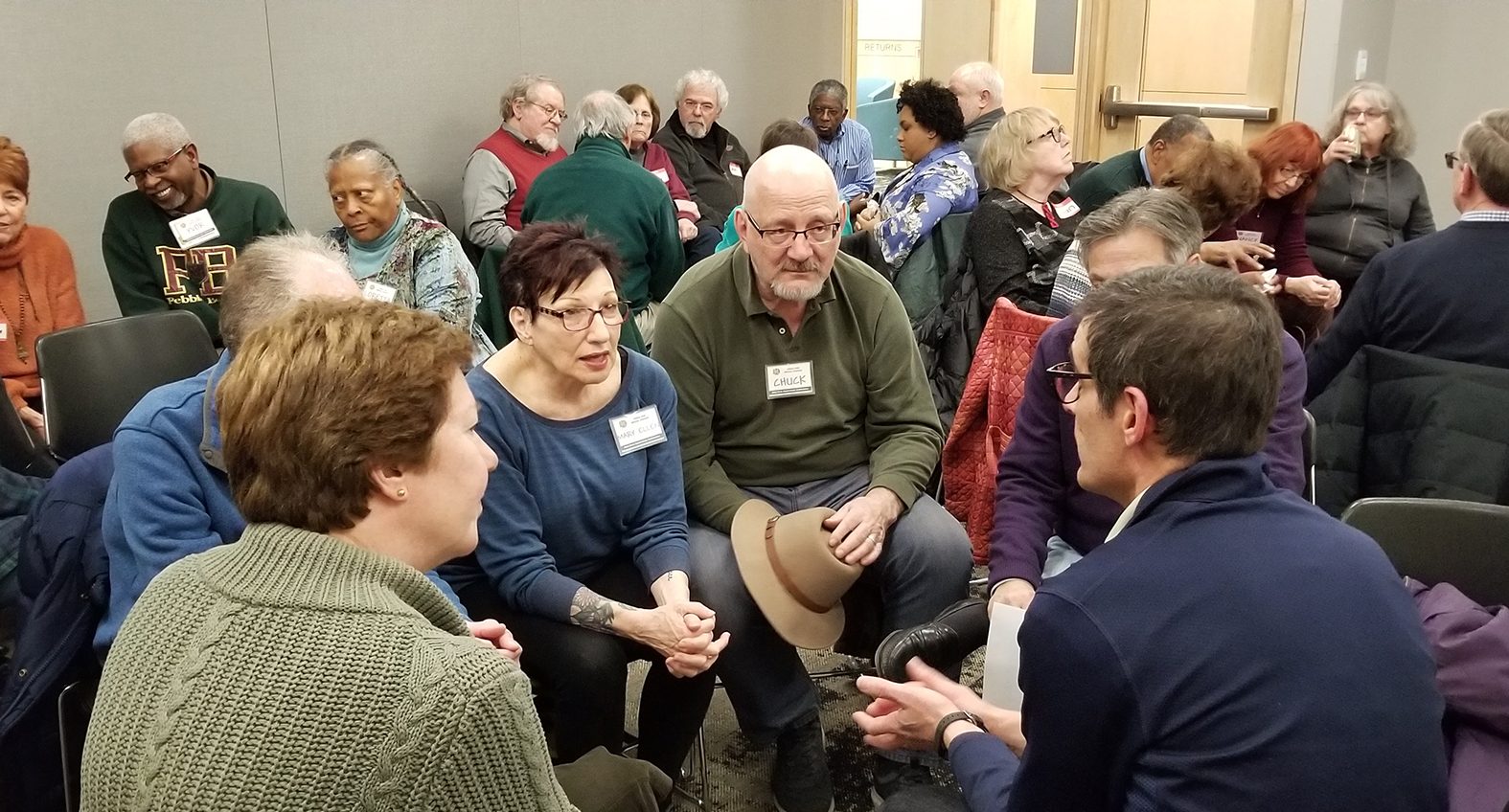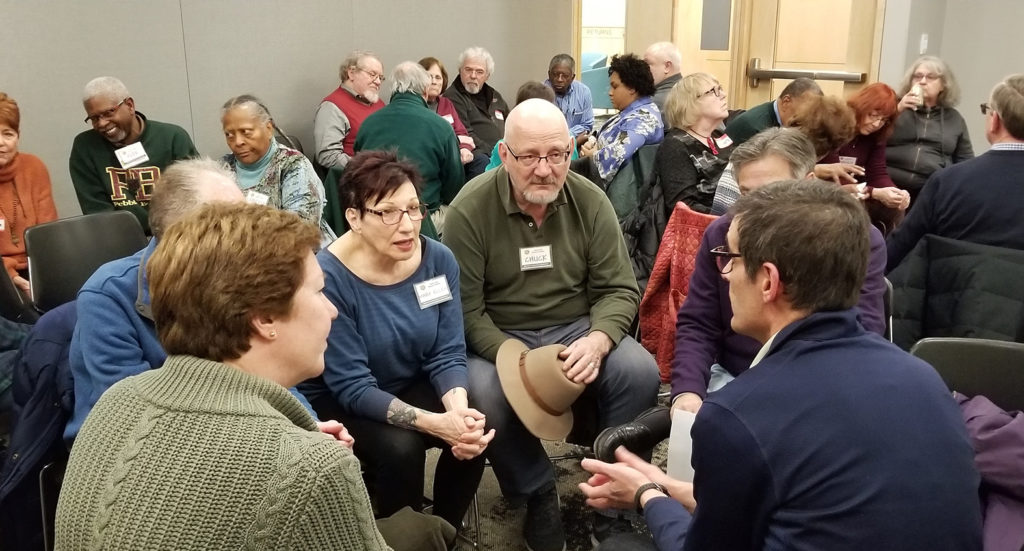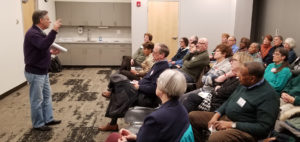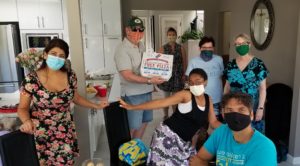



By Karen Withem
When someone says pizza, social justice is not usually the first thing that comes to mind. Yet the two have become a couple, thanks to a handful of people led by Nancy and Adrian McKee who live near Glen Ellyn, Illinois.
The Pizza & Social Justice website invites people to “Come for the Pizza, Stay for the Conversation.” And stay they have. The semiweekly dialogues, now entering their ninth year, focus primarily on racial justice. Nancy McKee says it has been designed as a “judgment-free zone,” so people feel comfortable airing their feelings and experiences in order to develop mutual respect and friendship.
These informal gatherings have very recently come under the umbrella of a new, non-profit organization. But they began simply as open house-type dinners and conversation hosted by the couple. “We would spend the evening talking and laughing and solving the problems of the world,” Nancy muses.
A natural topic
The McKees, who met at a Baha’i event not far from where they now live, have been married almost 40 years. Their relationship as an interracial couple made it natural for the topics of racism and social justice to come up, which became ongoing themes of conversation.
“It became especially clear in the 2016 election cycle that we needed to talk about race,” Nancy says.
So the couple hosted a screening of The Long Shadow, a PBS documentary directed by Frances Causey. The filmmaker — a white woman uncomfortable with the entrenched racism in her home state of North Carolina and with slave ownership in her own family history — gave the McKees permission to screen the film.
“We had a lot of help publicizing the event,” Nancy remembers, from the Baha’i community and area churches. A local school allowed them to use the auditorium free of charge. After the screening, the couple led a question-and-answer session. The attendance was around 90 strong, and most of the viewers expressed a desire to participate in follow-up meetings and conversation. Attendance would often swell to 20 or more, and eight of the regulars became a steering committee of sorts.
The conversations can be heavy, so the couple injects their own brand of gentle humor. The pizza is important, because as Adrian jokes, “In the time-honored Baha’i tradition, if you feed them, they will come.” As a web developer, he created and curates their site, searching the Internet each week and adding links to articles and videos that illuminate the subject and spur thought and meaningful dialogue.
Taking measures to preserve respect
“We start our meetings with ‘rules of engagement’ because people nowadays don’t know how to talk respectfully to each other, or listen to each other,” Adrian says. The pair believe that listening is an important component of these meaningful dialogues, and they consciously foster this aspect of conversation.



“The rules are to be respectful, and make sure everyone is heard who wants to be heard. We do not shy away from talking about systems of racism. We will discuss politics but we don’t allow partisan politics, or criticizing people or organizations.”
Nancy adds, “I’m not shy about saying, hey we’re crossing over the line here.” By intention, the gatherings include people of different faiths and personal backgrounds. “We try to conduct the meetings by the principles of the [Baha’i] Faith without delineating it,” Nancy says.
The group dialogues touch on various social issues; however, the topic of racism is at the heart of their meetings. “With all the civil rights legislation and such, nothing will happen until we form friendships,” Adrian observes.
Ginnie Judd learned about “Pizza & Social Justice” in 2018 when they were meeting at her church, St. Mark’s Episcopal Church in Glen Ellyn. “The name ‘social justice’ attracted me,” she says, and now she is a board member for the organization.
Defying expectation, in a good way
She works for a nonprofit whose focus is on environmental justice, and she expected the meetings to be a call to action — protest marches, calling legislators and the like. Instead, she found the meetings to be a process of “opening hearts and minds in a nonjudgmental way in small groups,” she says. The meetings “send small ripples out into the world, helping change our own behavior and mindsets, so we can start healing ourselves and whoever we come into contact with.”
“We white people haven’t been well educated in what white privilege is, what kinds of injustices are out there,” Judd observes.
She remembers witnessing a learning moment in one meeting. “One of the videos talked about how race is a social construct. A member said, ‘What does that mean?’ She was really taken aback.
“We grow up thinking that since genetics cause blue eyes and brown eyes, any physical distinctions are based on some kind of reality that sets your lot in life,” Judd says. “It was nice to see her have a lightbulb moment and feel safe enough to voice it.”
A formal organization
Obtaining 501(c)3 U.S. Internal Revenue status took a year and required hiring an attorney to assist with document preparation. It means that they can now fundraise, and the newly assembled directors are brainstorming about additional ways the organization can contribute to the spiritual life of the community.
Part of their mission is to go beyond hosting, and mentor Baha’is and others who want to create similar ongoing meaningful conversations. Adrian designed a “Do-it-Yourself” help page with a “contact us” button, so people may reach out to them for advice and encouragement. “We have about 350 pre-screened videos,” he says, which serve as catalysts for the dialogues. The website suggests alternatives to videos, like inviting a speaker or choosing an article to read and discuss. “The point is to get together to talk, and the conversation is free to go wherever it has to go,” he notes.


In September the group was invited by a local library to demonstrate the program for youth. “We watched a video, a conversation starter,” Nancy says. Among the attendees was a young woman. She and her fiancé placed a high value on social justice, but her future in-laws did not, and she was unsure how to respond when they repeatedly challenged her views. “She was feeling terribly ganged-up on,” Nancy says. “So we spent an hour talking about ways for her to respond when they tried to bait or provoke her.” In response to this immediate need, Adrian says they provided her with strategies to change the tenor of the family conversation.
For years the “Pizza & Social Justice” meetings were “around the dining table,” or occasionally at a restaurant. Since the pandemic began they’ve taken place instead through Zoom.
Judd praises Adrian’s quick adaptation of the group’s meetings to the internet platform in response to the pandemic. Because of this, she says, they “didn’t miss a beat.”
While Nancy misses the warmth and fun of in-person gatherings, she says that meeting virtually has one advantage. “People from all over the country participate.”


![]()
![]()
Whether you are exploring the Bahá'í Faith or looking to become an active member, there are various ways you can connect with our community.
Please ensure that all the Required Fields* are completed before submitting.